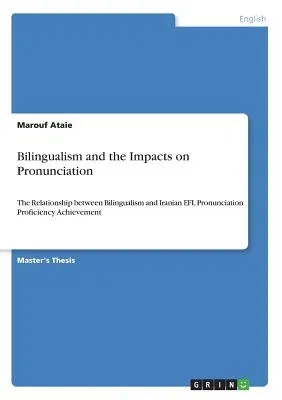Master's Thesis from the year 2014 in the subject English Language and
Literature Studies - Linguistics, grade: Advanced, language: English,
abstract: The aim of the study was the relationship between bilingualism
and Iranian EFL learners' pronunciation proficiency achievement. A
convenience sample consisting of 60 Iranian male pre-intermediate EFL
learners with an age range of 17 to 23 participated in this study. the
whole sample were divided into two groups, that is 30 bilinguals from
Louranica English Teaching Institution in Jask, who use their mother
tongue, Balouchi, in the local and informal communications and Persian,
as a second language, in the official communications, were compared with
30 monolinguals from pre-intermediate EFL learners of Niavaran Foreign
Language institute in Kerman using only Persian in all of their
communication and conversations. Both groups of the participants were
Iranian pre-intermediate EFL learners of different cultural background
and attitudes. Results showed that bilingualism affects the learners'
achievement of English pronunciation. There are significant differences
between bilinguals and monolinguals in regard to learning English
pronunciation. Also the existing English words and sounds in bilinguals'
L1 have important impacts on their English pronunciation development.
Human being is always capable of making integration of what he/she
possesses to expand his/her understanding of the surrounding world and
since communication is indeed of first steps in any understanding,
people are to strive preparing of any tools helping them out in this
field. Language is the most outstanding tool in any communication and
people who owns more than one languages are doubtlessly more successful
in their communications with the people of other nations. Bilingualism
is actually the simultaneous possessing of the complete knowledge of two
languages and the ability to make use of those languages in the daily
communications.


